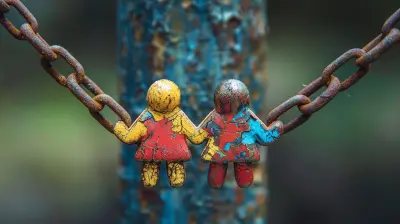Empathy Starts at Home: Raising a Compassionate Child
13 December 2024
Empathy is one of those superpowers, isn’t it? It’s the ability to step into someone else’s shoes and understand what they are going through. Wouldn’t the world be a better place if everyone had a bit more of this magic? Well, as parents, we have the unique responsibility—and privilege—of nurturing empathy in our children. Spoiler alert: It all starts at home.
In this fast-paced world, raising a compassionate child might seem like a tall order. With technology, competitive environments, and individualism at an all-time high, empathy can sometimes take a back seat. But here's the good news: Kids are naturally wired for kindness, and as a parent, you play a key role in helping that compassion bloom. Let’s dive in and talk about how to raise a child who not only understands others’ feelings but genuinely cares.

Why Is Empathy So Important?
Before we get into the how, let's talk about the why. Why should you even care about teaching your child empathy when there are so many other things on your parenting checklist? Well, empathy is more than just a “soft skill”—it’s a life skill.Empathetic kids tend to have better relationships, develop stronger communication skills, and are more successful in both personal and professional settings. Think about it: Who doesn't want to be around a person who truly listens and understands?
Moreover, empathy helps combat bullying, cultivates fairness, and teaches kids that we're all in this together. It’s the glue that holds communities, friendships, and families together.
The Ripple Effect of Empathy
Empathy isn’t just beneficial for the child; it has a ripple effect. When kids learn to empathize, they naturally impact their surroundings—making the world a more compassionate place. Whether it's comforting a friend, advocating for the underprivileged, or just being a kind human being, empathetic kids grow into adults who make a difference.
The Building Blocks of Empathy
Understanding empathy can be broken into two main parts: _emotional empathy_ and _cognitive empathy_.1. Emotional Empathy: This is when your child genuinely feels what another person is feeling. Ever noticed how kids cry when they see someone else crying? That’s emotional empathy kicking in.
2. Cognitive Empathy: This is a more mature form of empathy where your child can understand and rationalize someone else’s perspective without necessarily feeling their emotions. Think of it as mind-reading but with kindness.
The goal isn't just to teach your child to _feel_ for others but also to _understand_ them on a deeper level.

How to Foster Empathy at Home
Alright, so how do we actually go about raising a compassionate child? Here are some actionable strategies to instill empathy in your little one.1. Be a Role Model
Yes, it starts with you! If you want your child to grow into a compassionate adult, you first need to walk the talk. Every day presents opportunities to model empathy. Whether it’s noticing when someone is upset, offering help to a neighbor, or even showing kindness to a stranger, your actions resonate.Kids are sponges; they absorb everything around them. When they witness you being empathetic, they’re more likely to mirror those behaviors. Make empathy part of your daily routine, and you'll see it reflected in your child’s actions.
> Example: Let’s say you were irritable after a long day at work, and you snapped at your child. Afterward, if you apologize and explain why you were upset, you’re showing your child that it's okay to admit when you're wrong and to consider others' feelings.
2. Encourage Open Communication
A key part of empathy is understanding, and you can’t understand someone else if you're not willing to listen. Encourage discussions at home. Let your child express their feelings, thoughts, and concerns without judgment.Create an environment where your child feels safe to talk about their day, who they played with, and even their struggles. When they feel heard, they’re more likely to value others’ voices too.
Ask Open-Ended Questions
Instead of asking, "Did you have a good day?" try, "What was the best part of your day?" or "How did you feel when that happened?" Questions like these prompt children to think further and express their emotions more accurately.3. Teach Emotional Literacy
Children can't show empathy if they don’t even understand their own feelings, right? That’s where emotional literacy comes in. Help your child put names to the emotions they're feeling. It’s not just about being "happy" or "sad"—there are so many more emotions in between!When your child is upset, sit down with them and help them identify whether they’re feeling frustrated, disappointed, or maybe even scared. Once they can recognize their own emotions, they’ll be better equipped to recognize those feelings in others.
You can make this fun by using emotion charts or emotion cards—both powerful tools to help kids articulate what’s going on inside their heads.
4. Encourage Perspective-Taking
Ah, the classic “walk in someone else’s shoes” lesson. Teaching your child to consider other points of view is essential to cultivating cognitive empathy. One easy and fun way to practice perspective-taking is through storytelling.When reading books or watching movies together, pause every now and then to ask your child how they think the characters feel.
> Example: “How do you think the character felt when their friend didn’t share?” or “Why do you think she was sad after that happened?” These small practices help kids start imagining life from someone else’s perspective, laying the groundwork for deeper empathy.
5. Praise Empathetic Behavior
Positive reinforcement works wonders when you're parenting! When your child shows kindness or empathy, make sure to acknowledge it. Celebrate those moments by praising their actions.You don’t always need to go overboard with rewards (although, sometimes, a big hug works wonders). Simply saying, “That was really kind of you to help your friend when they were sad,” can leave a lasting impression on your child.
6. Address Harmful Behavior
We’ve sung a lot of praise about teaching empathy, but what happens when your child does something that’s, well… not very nice? Maybe they said something hurtful or left someone out on the playground. Don’t let these moments slide.Instead of scolding right off the bat, try asking them how they would feel in the other person’s shoes. This is a great way to turn a less-than-perfect situation into a teachable moment. Gently nudging them to think about how their actions affect others will encourage self-awareness and empathy.
7. Volunteer or Donate as a Family
Actions speak louder than words, right? One of the best ways to show empathy in practice is by giving back to the community. Whether it’s serving at a soup kitchen, donating toys and clothes to family shelters, or even helping a neighbor in need, community service has a way of expanding your child’s world and allowing them to see life from different perspectives.Volunteering also helps children understand that they can make a tangible difference in someone’s life, reinforcing the value of kindness and empathy.
8. Practice Patience
Let’s be real: Teaching empathy doesn’t happen overnight. It’s not like flipping a switch. Children naturally focus on their own needs and wants (nothing wrong with that; it's developmental!), so you’ll need to be patient as they learn to consider others’ feelings.There will be times when your child messes up. When that happens, try to be patient and offer gentle corrections rather than getting frustrated. Remember, this is a learning process.

Common Myths About Empathy in Children
Before wrapping up, let’s address a few myths that might be floating around about empathy and children.1. “Some Kids Are Just Born Empathetic”
Not exactly. While personality plays a part, empathy is largely a learned behavior. Just like teaching your child to ride a bike or brush their teeth, empathy needs to be taught and practiced regularly.2. “Boys Are Less Empathetic Than Girls”
This is an age-old stereotype that simply doesn’t hold up. Boys can be just as empathetic as girls. The key is how empathy is nurtured at home, regardless of gender.3. “Empathy Is Too Hard for Young Kids”
Though empathy might seem like a complex emotion, even very young children can grasp basic forms of it. In fact, toddlers often show signs of empathy by offering their toys to upset friends. It’s not too early to start!Final Thoughts
Raising a compassionate child is one of the most meaningful gifts you can give the world. While society often emphasizes academic success or athletic prowess, empathy is the heart of what it means to be a good human being. By nurturing empathy at home, you’re raising a child who will go on to spread kindness, understanding, and connection in every room they enter.To sum it up: It’s not easy, it’s not always immediate, and sometimes it’ll feel like you’re talking to a wall (it happens!). But, piece by piece, you’re building empathy in your child, and trust me, it’ll be worth it in the long run.
So, are you ready to raise a compassionate little human? It all starts at home—one small act of kindness at a time.
all images in this post were generated using AI tools
Category:
Emotional IntelligenceAuthor:

Zelda Gill
Discussion
rate this article
14 comments
Matilda Daniels
This article beautifully highlights the foundational role of empathy in parenting. By modeling compassion and actively engaging in heartfelt conversations, we can nurture our children into kind-hearted individuals. Simple daily practices create lasting impacts, fostering a generation that values understanding and care for others.
February 6, 2025 at 3:39 AM

Zelda Gill
Thank you for your thoughtful comment! I'm glad you resonated with the importance of empathy in parenting. It's truly transformational for both parents and children.
Upton McCallum
Empathy isn't just taught; it's caught. Let your children witness kindness in action, and you'll raise not just compassionate kids, but future leaders.
January 30, 2025 at 4:42 PM

Zelda Gill
Absolutely! Kids learn from example, and witnessing kindness cultivates empathy and leadership. Let's lead by action!
Myles Mendoza
Great insights! Teaching empathy through everyday interactions truly shapes compassionate future leaders. Thank you!
January 26, 2025 at 3:21 PM

Zelda Gill
Thank you for your kind words! I'm glad you found the insights valuable—teaching empathy at home is so crucial for our future leaders.
Wendy Hughes
Empathy isn’t taught; it’s caught. As parents, we must model compassion in every interaction. Let’s stop waiting for schools to instill values. It’s our duty to raise kind, understanding humans. The world needs more empathy—let’s start creating it at home.
January 22, 2025 at 5:31 PM

Zelda Gill
Absolutely! Modeling empathy at home is crucial for nurturing compassionate individuals. Let's lead by example and create a more empathetic world, one child at a time.
Mika Cook
Thank you for this beautiful reminder! Teaching our children empathy truly begins at home, and your insights inspire us to cultivate kindness and understanding in our families.
January 19, 2025 at 3:22 PM

Zelda Gill
Thank you! I'm glad you found it inspiring. Together, we can nurture empathy and kindness in our families.
Dylan McBride
Great article! Teaching empathy to our kids is so important. It’s heartwarming to see them embrace kindness and compassion—it truly shapes their future!
January 14, 2025 at 4:40 PM

Zelda Gill
Thank you! I’m glad you found it valuable. Teaching empathy at home really does lay the foundation for a kinder future.
Jinx Cain
Absolutely! Teaching empathy at home is like planting a garden; it takes a little time, patience, and maybe a few weeds to pull out (looking at you, tantrums!). But soon enough, you’ll have a flourishing little human who knows how to sprinkle kindness like confetti! 🌼🎉
January 8, 2025 at 5:43 PM

Zelda Gill
Absolutely! Nurturing empathy at home truly cultivates kindness and resilience in our children. 🌱💖
Kian McKinnon
Sure, because nothing says “compassion” like a toddler sharing their toys—said no parent ever!
January 5, 2025 at 4:23 PM

Zelda Gill
True! Teaching empathy in early years can be a challenge, but every small step counts.
Vesper Bennett
Great insights! Compassion truly shapes our children's futures.
January 3, 2025 at 5:19 AM

Zelda Gill
Thank you! I’m glad you found the insights valuable. Compassion is indeed foundational for our children’s growth.
Shelby McAllister
This article beautifully highlights the importance of nurturing empathy in our children. As parents, we often underestimate our influence. Simple, everyday actions and conversations can cultivate compassion, helping our kids develop a deeper understanding of others’ feelings. A vital lesson!
December 25, 2024 at 4:51 PM

Zelda Gill
Thank you for your thoughtful comment! I'm glad the article resonated with you and emphasized the crucial role parents play in fostering empathy. Every small action truly makes a difference!
Lydia Ward
This article beautifully highlights the importance of fostering empathy at home. By modeling compassion and kindness, we can equip our children with the emotional tools they need to thrive and positively impact others.
December 21, 2024 at 5:18 AM

Zelda Gill
Thank you for your kind words! I'm glad you found the article meaningful; fostering empathy at home truly lays the foundation for a compassionate future.
Marcus McVicar
Sure, teaching empathy is as easy as pie! Just sprinkle some fairy dust, throw in a few unicorns, and voilà—a compassionate child! Who knew parenting was just a magical recipe? Forget about the sleepless nights and tantrums; it's all about the warm and fuzzy feelings. Pass the glitter, please!
December 14, 2024 at 3:56 PM

Zelda Gill
I appreciate your humor! Empathy is indeed a challenging journey, but it’s built through consistent effort, love, and understanding, not magic.
Wesley Adkins
Oh sure, because teaching empathy is as easy as hand-crafting organic kale smoothies for toddlers while juggling nap schedules and tantrums, right?
December 13, 2024 at 4:22 PM

Zelda Gill
I appreciate your humor! While it can be challenging, fostering empathy at home is a gradual process that can make a lasting impact.
Dixie Hill
Thank you for this insightful article! It's a beautiful reminder that our children absorb our actions and words. By fostering empathy at home, we can nurture compassionate hearts that will make a positive impact in the world.
December 13, 2024 at 5:29 AM

Zelda Gill
Thank you for your kind words! I'm glad the article resonated with you. Together, we can indeed shape a more compassionate future.
MORE POSTS

The Unexpected Lessons Motherhood Teaches You About Yourself

How to Validate Your Child’s Emotions Without Over-Indulgence

How to Nurture Yourself While Raising Kids

Understanding the Connection Between Parenting Styles and Academic Success

Toddler Sleep Regression: Causes and Solutions

Raising a Strong-Willed Child: How Parenting Style Affects Outcomes

How to Navigate Big Emotions During Transitions

Exploring Nature Trails with Young Children

Fostering a Home Environment That Reduces the Risk of Bullying